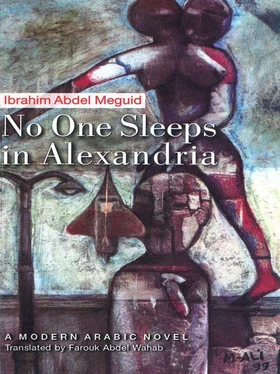Dimyan saved Magd al-Din from his sorrow by taking him one evening to a faraway café on Mahmudiya Canal between the Raghib and Karmuz bridges, where lupino bean vendors lived in the houses scattered along the street parallel to the canal. They would place the lupino beans in sacks, which they secured firmly and left in the running water of the canal for a few days until the bitterness was gone. They would then pull the sacks to the bank of the canal and load the beans onto pushcarts and start selling them in the early morning in the neighborhoods of Raghib, Karmuz, Mahattat Masr, and Muharram Bey to the east and Qabbari and Kafr Ashri to the west. In the evening they would return exhausted and leave their pushcarts safely on the bank of the canal. In the morning they began their rounds again. A few of them sat in the remote café, in the empty area that was a good place for murder and love, as well as prayer and devotion.
Magd al-Din and Dimyan sat every evening in the very small café on the bank of the canal, which was really no more than a few wooden tables and straw chairs outside a small tin-sheet kiosk in which the coffee and tea were made. A pleasant breeze blew from Mahmudiya, laden with white mist, as if winter wanted to breathe its last breath there. In front of them passed boats with their sails unfurled, pulled from the bank by strong men with ropes tied between the masts and their chests. Around the big boats were small, colorful feluccas, in which young people were singing and making merry. The boats came from all over, ended their route at Nuzha, then went back.
Magd al-Din felt that everything around him was free except him, who had been shackled to Alexandria indefinitely. He was doomed to stay in the very Alexandria where yesterday he had seen Ghaffara, the sawdust vendor, stand in front of his cart and donkey and exclaim, “Please God, let Italy get together with Germany so Alexandria might be lit up with foreigners and sexy dames!” Everyone laughed — the passers-by as well as the store owners who bought sawdust from him to strew on the floor before sweeping their stores at the end of the day.
Ghaffara had a wooden cart with a wooden box about one meter high extending the length of the cart, about two meters, The cart was drawn by an old donkey that always looked exhausted. On both sides of the cart Ghaffara had written “Capacity: four tons; nationwide transportation; will take telephone orders and deliver sawdust.” People would read the sign and laugh, as the whole cart — the wood, the donkey, sawdust, and Ghaffara himself — could not weigh a quarter of a ton. Ghaffara had appeared the day before with a fez on his face. He had removed the tassel of the fez and attached a rubber band that secured it behind his head. He had attached a round water filter to what had been the top of the fez and cut two small holes, into which he fixed two pieces of glass that stuck up to protect his eyes. He told everyone that he had heard an educated man reading from the newspaper about a proposal submitted by a doctor to the ministry of health to use fezzes as gas masks, since there were no gas masks in the market. Since the face and head had the same circumference, the fez could be secured to the face by means of a rubber band and a person could then make mica eyes for the fez. Ghaffara did not know where one could buy mica, so he used glass instead. The doctor suggested placing an air filter through which to breathe. In the stores in Attarin, Ghaffara could find no air filters, so he bought a small water filter. But there were no gases, or even raids against Cairo, or Alexandria, or anywhere else in Egypt. Ghaffara knew that and countered that the air in general was dirty and full of poisonous gases. One did not have to wait for the raids to get the gas.
Cannons were fired in Alexandria and throughout the country to bring the good news that a new precious gem had been added to the royal crown, as Princess Fawziya had given birth to a baby girl on the eighth of April. When the news was broadcast, a large number of Egyptians went to the royal palace in Cairo to offer their felicitations. Contrary to what was expected, Hitler did not attack Holland, Belgium, or France. He attacked Norway and Denmark instead. Russia was now done with Finland. The northern seas witnessed the fiercest battles over Norway, but the king of Denmark surrendered quickly and called upon the people to be calm. The Germans increased their pressure against the Allied forces in Norway. Troops from Rhodesia arrived in Egypt and were welcomed in Suez harbor by Ahmad Rasim Bey, the governor of Suez, whom the newspapers did not mention was also a great poet who wrote in French, and also a great lover of women. Joining him to welcome the troops was the British minister plenipotentiary, who delivered a speech welcoming them on behalf of the soldiers of the empire, not just in Egypt but in the “greater fatherland, from New Zealand to India.”
Dimyan was beset by fits of dry coughing. He told Magd al-Din that he was afraid he might have developed asthma, in which case he would undoubtedly die, since a bottle of Mendaco pills cost thirty piasters, and besides there was a shortage since it was usually imported from England, and that was no longer feasible because of the war. Then Dimyan looked sad and told Magd al-Din that he had decided to go to church, confess his sins, and go regularly on Sundays. The Prophet’s birthday had already passed in silence. People listened to the Quran on the radio, but there were no nighttime celebrations with the usual pavilions. Huge amounts of traditional sweets and sugar dolls and horses were still sold, however. Dimyan was observing Lent, which he believed was two weeks too long. He went to church without much thought and came back with tired eyes. “I cried a lot, Sheikh Magd,” he said, “and the reverend father blessed me. I asked Mari Girgis to find a permanent job for you and me. And, as you can see, I am no longer coughing. The reverend gave me oil that got rid of the cough. Faith is sweet, Sheikh Magd. It’s thanks to you that I’ve found faith, even if you didn’t mean for it to happen. I had forgotten that faith, and men of faith, were still around.”
Sitt Maryam gave Zahra a jar of ‘Hazelin Snow,’ a compact of powder and some lipstick and taught her how to use it. She told her, “You’re still young, so why not do this for Magd al-Din’s sake?” Magd al-Din saw her and realized what had happened but did not say anything at first. His wife was going to learn the ways of the big city whether he wanted it or not, and he had to keep quiet about it, otherwise she would seek it even more. He knew that forbidding something only made it more desirable. He even went out of his way to say to Zahra, “You’ve become more beautiful than before.” And he knew he was not lying. He would come home exhausted after making the rounds of the factories along the Mahmudiya canal. He had made it all the way to the warehouses of the credit bank in Kafr Ashri. He had carried heavy sacks on his back all day long or worked at the cotton ginneries in Mina al-Basal amid hundreds of women who carried the raw cotton before the seeds were extracted, and he saw the collapsed chests of men with respiratory diseases as a result of inhaling the cotton dust, especially those men who oversaw the initial ginning process. And yet work was not always available, since the little cotton at hand had been left over from the previous season. So he made the rounds of the boats anchored in Mahmudiya Canal to load or unload cargo. From time to time he would catch himself looking around for someone and always found Dimyan, who never left his side. But he was not looking for Dimyan, but rather the murdered idiot boy of whom he thought quite often. And so as days passed, employed or unemployed, that huge area in the south of Alexandria became the daily arena of Magd al-Din and Dimyan, a painful arena from which he came back longing for something beautiful. And he was not lying when he told Zahra that she had become more beautiful. Biba Izz al-Din opened her summer season at Teatro Diana at Raml Station, as she did every year, but earlier than usual. Cinema Metro screened The Wizard of Oz, and the music caught on with the soldiers in the trenches and battlefields in Europe. Early khamasin dust storms blew in from the Western Desert for one whole day. As the month of May arrived, the Muwasa Society had finished building its hospital in Mina al-Basal. The city of Alexandria banned swimming in Anfushi this year, and future years if the war continued. The Christians celebrated Easter and seemed more joyous than at Christmas. The final examinations in schools started, and Zahra noticed that Camilla was looking paler, that she was not her usual cheerful self. Zahra asked her what was the matter, and she said she really loved school and that this happened to her every year with finals and the beginning of the long summer vacation. Zahra was surprised, and continued to notice Camilla’s pallor, and saw her more than once struggling to hide her tears. She was surprised to see Yvonne also look pale. She talked about it to Sitt Maryam, who seemed baffled. Lula got into the conversation, saying, “If it was just one girl, we’d have said it was love.” Zahra looked at her, annoyed, and Sitt Maryam blushed. At night Zahra thought a lot about the two girls and told herself that one of them was in a tight spot and the other knew about it. She immediately added to herself that Camilla, who showed more pallor and who had an angelic face like that of the Blessed Virgin Mary, was the one in the tight spot. She was like a flame that would not quit until it was extinguished. She asked God for forgiveness and to protect the two girls and the good family. The streets and gardens filled with lettuce leaves, green chickpea plants, green onions, and remnants of herring, sardines, and onion skins. True, all of that was in the garbage bins, but the passers-by and even people indoors could smell it. Zahra went out for the first time on a felucca in Mahmudiya Canal with Camilla, Yvonne, and Sitt Maryam, and they went to the zoo. Everything around them appeared cheerful, even the two girls. But their laughter was not as joyful as usual. Besides, Camilla left them and disappeared for more than an hour, then returned. Zahra noticed a new color in her cheeks and a joy that disappeared only minutes after her return. Those days, Camilla was never seen without an English book in her hand. She and her sister were enrolled in the most famous secondary school in Alexandria, the Nabawiya Musa School.
Читать дальше












